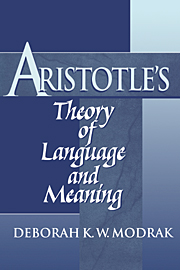2 - Truth and Necessary Truth
Published online by Cambridge University Press: 16 November 2009
Summary
No sooner has Aristotle summarized his theory of meaning in the De Interpretatione than he turns to the topic of sentences. Sentences are the basic linguistic item to which truth values can be assigned, and they are made up of linguistic units that have meaning. To avoid the problems of the Cratylus, Aristotle draws a sharp distinction between the basic units of meaning and the basic truth-functional entities. He also acknowledges that language has functions other than assertion. That said, sentences have truth values in virtue of what is expressed by the sentence, and this is a function of the meaning of the parts of a sentence. A sentential part has a meaning just in case it is a conventional sign for a thought, the content of which is determined by its relation to an object that is external to the thought. Combining terms to make an assertion yields a statement that expresses a nexus of external features. Whether the assertion is true or not depends upon whether this nexus obtains in fact. Certain peculiarities of Aristotle's discussion of truth – more accurately described as a discussion of falsity – fall into place when one recognizes that Aristotle's starting point is a conception of truth-functional entities that are compounds. These compounds are constructed from meaningful (but not independently truth-functional) linguistic units. Similarly, certain peculiarities of his conception of necessity fall into place when it is recognized that for Aristotle the force of the necessity predicate is to indicate that the nexus of features always obtains.
- Type
- Chapter
- Information
- Aristotle's Theory of Language and Meaning , pp. 52 - 83Publisher: Cambridge University PressPrint publication year: 2000



